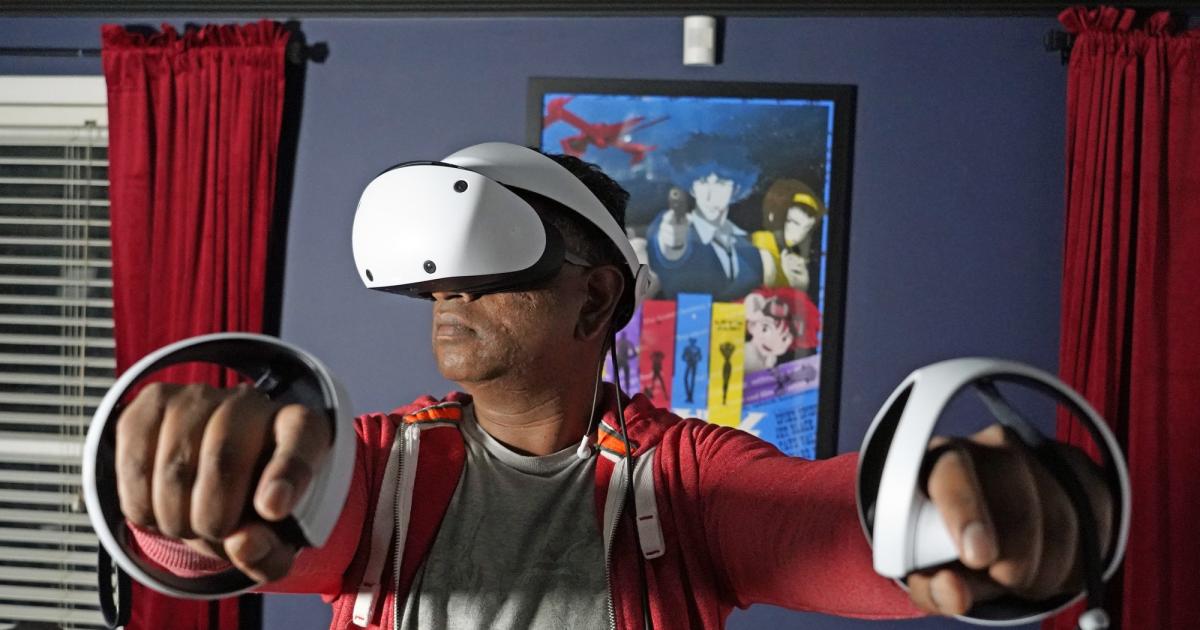The Morning After: The verdict on PlayStation VR2

PlayStation’s next-gen VR headset is here. It’s high-spec and, boy, high priced. Engadget’s Devindra Hardawar says it’s a massive step forward from the original PSVR, thanks to its high-resolution screens and innovative features like headset haptics.
Back in 2016, when the original launched, VR was making another push into the mainstream, which kicked off with the Oculus Rift and HTC Vive. The tech has evolved at an incredible pace, so seven years later, this sequel headset feels more comfortable and comes with far more advanced controllers. (The first PSVR used Move controller wands originally launched for the PS3 back in 2010!) The new Sense controllers are actually purpose-built for virtual reality, with a large tracking ring, analog sticks, two face buttons, triggers and haptic feedback.
Hardawar adds that Horizon VR, one of few marquee launch titles, taps into the headset's eye-tracking sensors for foveated rendering, concentrating the PS5's power on what you're looking at. However, that $550 price and a potentially limited library could limit its impact – the same old story of what’s wrong with VR.
– Mat Smith
The Morning After isn’t just a newsletter – it’s also a daily podcast. Get our daily audio briefings, Monday through Friday, by subscribing right here.
The biggest stories you might have missed-
Paramount+ prices are going up, whether you get Showtime or not
-
City of Oakland declares state of emergency in wake of ransomware attack
-
Plex's latest feature lets you skip movie and TV show credits
-
‘Star Trek: Picard’ lacks substance beyond callbacks and continuity porn
-
'Octopath Traveler 2' review: Eight different stories, but not enough connection
Microsoft launched its Bing AI chat for the Edge browser last week, and it's been in the news ever since – but not always for the right reasons. Our initial impressions were strong, as it offered workout routines, travel itineraries and more without a hitch. However, users started noticing Bing's bot gave incorrect information, berated users for wasting its time and even exhibited “unhinged” behavior, calling users "unreasonable and stubborn" (among other things) when they tried to tell Bing it was wrong. Those “long, extended chat sessions of 15 or more questions" can send things off the rails,” Microsoft explained.
"Bing can become repetitive or be prompted/provoked to give responses that are not necessarily helpful or in line with our designed tone," the company said. That apparently occurs because question after question can cause the bot to "forget" what it was trying to answer in the first place.
Google relies on human employees to improve Bard chatbot responses The chatbot 'learns best by example,' a company exec said.In a video ad for Google’s AI chatbot, Bard, the AI confidently spouted misinformation about the James Webb Space Telescope. Now, the tech giant is looking to improve Bard's accuracy, and according to CNBC, it's asking employees for help.
Google's VP for search, Prabhakar Raghavan, reportedly emailed staff members, asking them to rewrite Bard responses on topics they know well. The chatbot "learns best by example," Raghavan said, and training it with factual answers will help improve its accuracy. This memo came after Google CEO Sundar Pichai emailed employees, asking them to spend a few hours each week testing the AI chatbot. Google employees have reportedly criticized Pichai for a "rushed" and "botched" Bard rollout.
Watch the trailer for Apple's 'Tetris' movie set during the Cold War You could say it's a blockbuster.The story behind how Tetris became a global phenomenon is the basis of an upcoming Apple TV+ movie. Instead of shoehorning the blockbusting antics of the game into a movie – we see you, Pixels – the fast-paced trailer (soundtracked by "The Final Countdown") highlights some of the inherent tension between Soviet Russia, US capitalist forces and everyone stuck between the two. Henk Rogers, played by Taron Egerton, encounters resistance from a British media mogul who wants the game, KGB agents and even Mikhail Gorbachev.
Tesla admits its Full Self-Driving beta may cause crashes It is recalling 363,000 vehicles.The National Highway Traffic Safety Administration (NHTSA) announced on Thursday that Tesla is recalling nearly 363,000 of its vehicles because the Full Self-Driving software may cause a crash. Specifically, the NHTSA cites a risk to "exceed speed limits or travel through intersections in an unlawful or unpredictable manner increases the risk of a crash." Tesla will release an OTA update, free of charge, to its customers to rectify the issue, Reuters reports. The recall impacts over 362,000 vehicles.
* This article was originally published here
Comments
Post a Comment